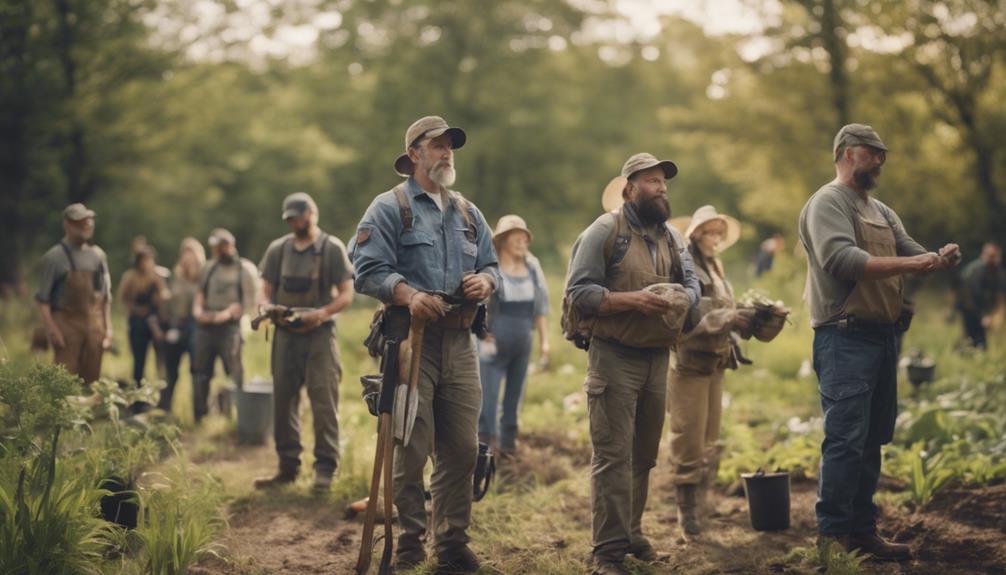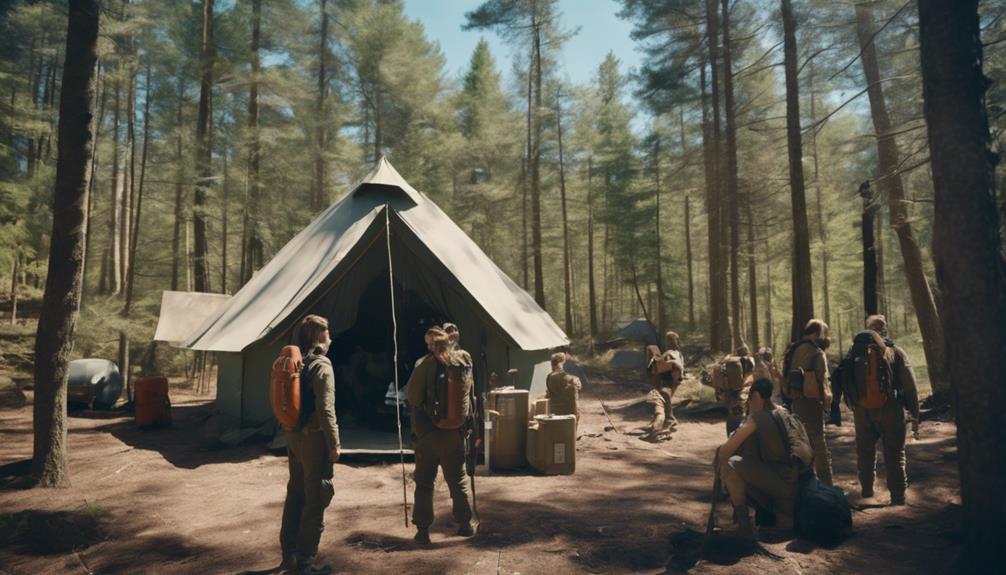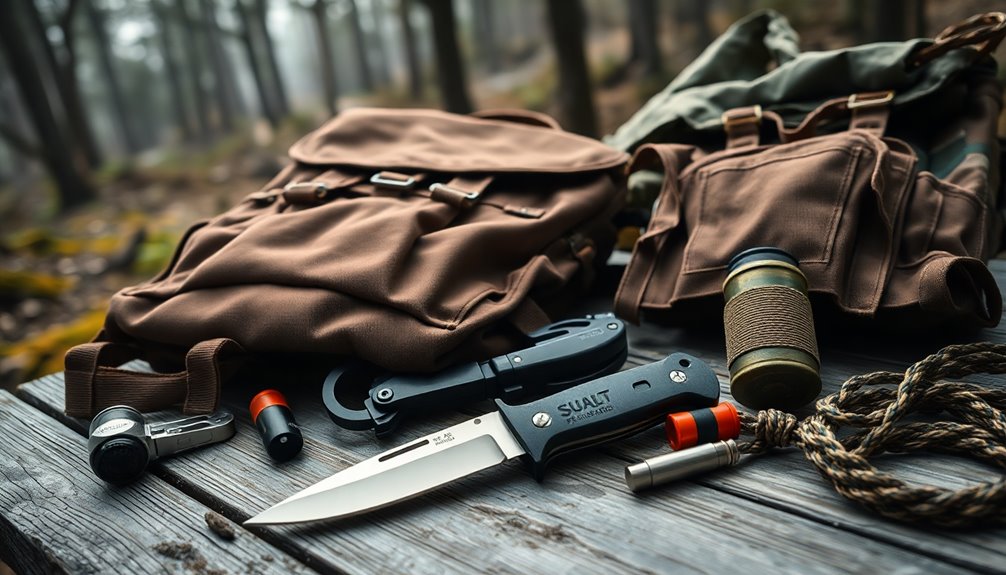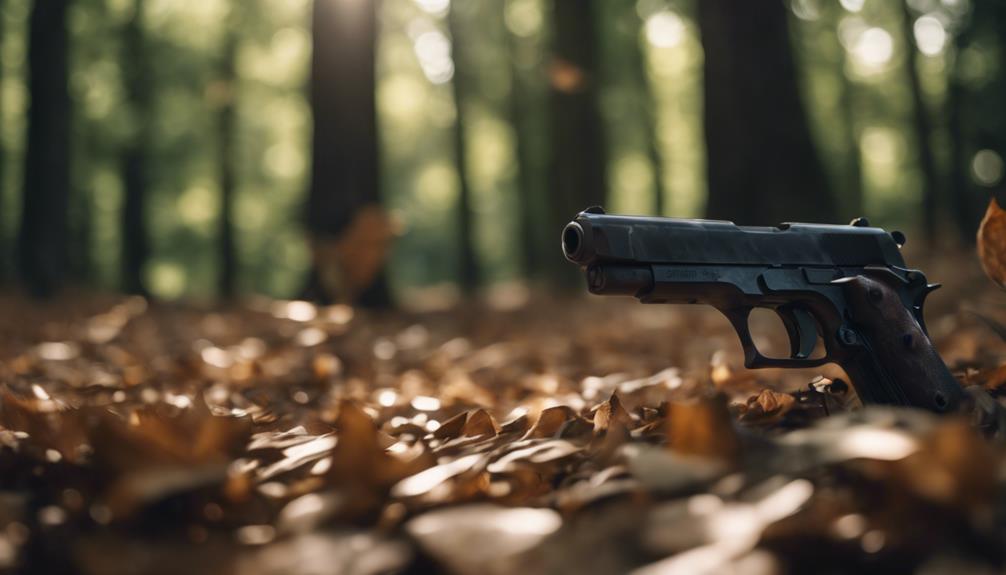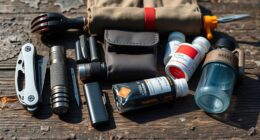When delving into American preppers, uncover the nation's top survivalists known for their readiness, self-reliance, and essential survival skills. These experts focus on realistic scenarios like hurricanes while preparing for extreme events. Key traits include self-reliance, adaptability, and extensive survival knowledge. Top survivalists excel in skills like first aid, fire-starting, water purification, and shelter building. Famous names like Bear Grylls and Les Stroud epitomize these principles. Survivalist communities emphasize self-reliance and preparedness through training programs and drills. Discover the essence of survivalist retreat locations, success stories, and the evolving landscape of American prepping.
Key Takeaways
- Bear Grylls, Les Stroud, Dave Canterbury, Cody Lundin, Mykel Hawke are renowned American survivalists.
- They emphasize self-reliance, essential skills, and preparedness.
- Top survivalists prioritize readiness for extreme scenarios.
- Community collaboration and continuous training enhance survival abilities.
- Their influence promotes learning and sharing of survival techniques.
Prepper Vs. Survivalist Mindset
How do the mindsets of preppers and survivalists differ in their approach to emergency preparedness?
In the United States, preppers and survivalists exhibit distinct approaches to preparing for potential disasters. Preppers, often portrayed in reality television shows, prioritize community and social networking in their preparations. They focus on realistic scenarios like hurricanes, emphasizing self-reliance and individuality.
On the other hand, survivalists are often depicted as isolated individuals who prepare for extreme and unlikely events, sometimes seen as more extreme in their prepping methods compared to preppers. The prepper mindset leans towards practical and immediate threats, while survivalists may explore less probable but severe outcomes.
These differing perspectives stem from how each group perceives risks and the types of emergencies they anticipate. Despite their contrasting strategies, both preppers and survivalists share the common goal of being prepared for unforeseen circumstances, albeit with varying degrees of intensity and focus.
Key Traits of Top Survivalists

Top survivalists prioritize self-reliance and individual preparation in the face of disasters, embodying a mindset focused on readiness and adaptability. With a growing number of individuals recognizing the importance of being prepared for unforeseen circumstances, these top survivalists stand out for their dedication to honing essential skills and maintaining a strategic approach to survival.
Whether in the bustling streets of New York or the harsh environments of the Middle East, their commitment to self-sufficiency remains unwavering.
These survivalists are known for their extensive knowledge of survival techniques, including foraging for food, hunting, and constructing shelters. They invest in high-quality gear and equipment, ensuring they're equipped for any scenario that may arise.
Continuous training and practice are key components of their routine, allowing them to stay sharp and adaptable in challenging situations. Their ability to prepare for a wide range of disaster scenarios sets them apart as top survivalists in the prepping community.
Must-Have Survival Skills

Mastering essential survival skills is important for preppers to effectively navigate emergency situations and ensure their preparedness for various scenarios. When preparing for unforeseen events, make sure to equip yourself with a range of critical abilities. Here are some key survival skills every prepper should possess:
| Survival Skill | Description |
|---|---|
| First Aid Knowledge | Understanding how to provide basic medical assistance can save lives in emergency situations. |
| Fire-Starting Techniques | Being able to start a fire for warmth, cooking, and signaling is essential for survival. |
| Water Purification Methods | Knowing how to make water safe to drink when clean water is scarce is crucial for survival. |
| Shelter Building | Creating shelters to protect yourself from the elements is critical for long-term survival. |
| Foraging for Food | Identifying edible plants and sources of food in the wild can sustain you during crises. |
Famous American Survivalists

Some of the most famous American survivalists include Bear Grylls, Les Stroud, Dave Canterbury, Cody Lundin, and Mykel Hawke.
Each of these individuals brings a unique set of skills and expertise to the table, showcasing their prowess in surviving challenging environments.
Their influence on prepping culture has encouraged many to learn essential survival skills and be prepared for unexpected situations.
Notable Survivalist Profiles
Among the notable American survivalists are Bear Grylls, Les Stroud, Cody Lundin, and Dave Canterbury, each renowned for their unique expertise in survival skills.
Bear Grylls, a well-known survivalist and TV personality, boasts extensive training and experience in tackling extreme environments.
Les Stroud, the creator and star of 'Survivorman,' is celebrated for his real-life demonstrations of survival skills in challenging scenarios.
Cody Lundin, a minimalist survivalist, stands out for his barefoot survival techniques and emphasis on simplicity in survival situations.
Dave Canterbury, a survival instructor and former military scout, is recognized for his mastery of primitive survival skills.
While Ray Mears, a British survival expert, isn't American, he deserves mention for his wealth of knowledge in bushcraft and wilderness survival techniques.
These survivalists have garnered widespread recognition for their contributions to the field of survival skills and continue to inspire many with their expertise and experiences.
Skills and Expertise
If you're looking for renowned American survivalists with exceptional skills and expertise in wilderness survival, Bear Grylls, Dave Canterbury, Cody Lundin, Les Stroud, and Tom Brown Jr. are among the top names to explore. These survivalists have honed their abilities through various experiences, making them experts in their field.
Here's what sets them apart:
- Bear Grylls, famous for his survival TV shows, showcases a wide range of wilderness survival techniques on-screen.
- Dave Canterbury, a former military sniper, brings his bushcraft skills and survival training to the forefront of the survivalist community.
- Cody Lundin, known for his expertise in primitive living skills, advocates for a minimalist approach to survival, emphasizing practicality.
- Les Stroud, as the host of 'Survivorman,' demonstrates his survival skills in remote locations, combining his knowledge with filmmaking prowess.
Additionally, Tom Brown Jr., with his tracking skills and wilderness survival expertise, founded the Tom Brown Tracker School, solidifying his reputation as a respected figure in the survivalist domain.
Influence on Prepping
Renowned American survivalists, including participants of the Doomsday Preppers TV show, have had a significant influence on the prepping community with their extreme survival techniques. These well-known figures showcase unique prepping strategies tailored for a range of disaster scenarios, such as economic collapse and environmental destruction. Their emphasis on self-reliance and individuality in preparing for large-scale disasters has resonated with many aspiring preppers. Their methods often involve building fortified shelters, stockpiling long-lasting supplies, and mastering essential survival skills. Many of these experts also offer **ultimate survivalist paradise tips**, guiding individuals on how to create a self-sustaining haven in the event of societal breakdown. These strategies not only promote readiness but also inspire a mindset of resilience and adaptability in uncertain times.
Notably, some of these American preppers have gained fame for their elaborate underground bunkers, missile silos, and dome setups, which serve as strongholds against potential catastrophes.
The practical skills demonstrated by featured families and individuals on shows like Doomsday Preppers, such as canning and water storage, have inspired others to take proactive steps towards disaster preparedness.
Survivalist Communities in the US

Survivalist communities in the US exhibit a strong emphasis on self-reliance and preparedness, fostering a culture of shared knowledge and skills.
These groups often come together for training sessions and drills, honing their abilities in various survival scenarios.
Community Strengths Analysis
Within American prepper communities, the emphasis on self-sufficiency and preparedness is a cornerstone that fosters a culture of readiness for various potential disasters. These communities engage in skills-sharing and training sessions to enhance their survival skills and knowledge.
Many survivalist communities have designated leaders who oversee group activities and preparedness plans. Members often participate in drills and simulations to practice their response to potential disasters. Additionally, survivalist communities in the US may have established communication networks and designated meeting points in case of emergencies.
Members diligently practice survival skills to be self-reliant in crisis situations. Training sessions focus on first aid, food preservation, shelter-building, and navigation techniques.
Leaders play an important role in coordinating group efforts and ensuring preparedness plans are in place. Regular drills and simulations help members refine their responses and adapt to different disaster scenarios.
Regional Survival Networks
Fostering a sense of community and preparedness, regional survival networks in the US serve as essential hubs for over 4000 members across nearly all 50 states to exchange disaster preparedness insights.
These survivalist communities prioritize practical skills like canning and water storage to guarantee self-sufficiency during emergencies. Members prepare for various scenarios, from natural disasters to societal collapse, stressing the importance of readiness.
The growth of these networks mirrors a lifestyle choice where prepping is proactive in securing personal and community resilience. By promoting a culture of preparedness, regional survival networks help individuals and families become more self-reliant and better equipped to face unforeseen challenges.
Emphasizing the sharing of knowledge and resources, these communities offer a platform for members to learn from one another and enhance their survival skills. In a world where uncertainties loom, these networks stand as beacons of preparation and support for those seeking to fortify themselves against adversity.
Survival Gear Essentials

Make sure you pack these essential survival gear items to enhance your preparedness for emergencies.
- Water Purification Tablets: Clean drinking water is vital for survival. These tablets can make contaminated water safe to drink.
- Multi-Tool: This versatile tool combines various functions like cutting, opening cans, and even acting as a screwdriver, making it indispensable in survival situations.
- First Aid Kit: Injuries can happen anytime. A well-equipped first aid kit can help you address wounds and medical emergencies effectively.
- Reliable Flashlight: Light is essential for visibility, especially during the night or in dark environments. A durable flashlight can be a lifesaver when traveling or signaling for help.
Having these items can significantly increase your chances of survival in challenging situations. Remember, being prepared with the right gear can make a difference when facing unexpected emergencies.
Survivalist Training Programs

Survivalist training programs equip you with essential skills for survival through hands-on experiences.
These programs teach you how to build shelters, forage for food, purify water, and navigate in challenging environments.
Skills for Survival
Engage in hands-on survivalist training programs to acquire essential wilderness survival skills like shelter building, fire starting, and navigation techniques. These programs provide a thorough learning experience to equip you with the knowledge and abilities necessary to thrive in challenging environments.
Here are four key components typically covered in survivalist training programs:
- Foraging for Food: Learn how to identify edible plants and sources of sustenance in the wild to meet your nutritional needs.
- Water Purification: Understand various methods to purify water and make it safe for consumption, ensuring hydration in survival situations.
- First Aid: Gain essential first aid skills to treat injuries and illnesses that may occur in the wilderness, potentially saving lives.
- Self-Defense Tactics: Acquire techniques to protect yourself from potential threats in survival scenarios, enhancing your safety and security.
Hands-On Experiences
Participants in survivalist training programs immerse themselves in hands-on experiences that encompass wilderness survival skills, self-defense tactics, and emergency preparedness. These programs offer a practical approach to learning essential skills like shelter building, fire starting, and foraging for food in challenging environments. Instructors provide guidance on navigation, first aid, and primitive tool-making techniques to enhance participants' survival capabilities.
Through realistic scenarios, experienced instructors test participants' survival skills and decision-making abilities. These scenarios aim to simulate diverse and unpredictable situations, allowing individuals to apply their newfound knowledge in a practical setting.
The ultimate goal of these training programs is to empower participants with the confidence and skills needed to thrive in the face of adversity.
Survivalist Retreat Locations

Remote hideaways in the mountains, forests, or deserts are favored locations for establishing survivalist retreats. When choosing the perfect spot for your survival retreat, consider the following:
- Proximity to Water Sources: Survivalists often opt for locations near rivers, lakes, or underground water reservoirs to guarantee a sustainable water supply for drinking, irrigation, and sanitation needs.
- Security Measures: Look for retreat locations with hidden entrances, underground shelters, or fortified structures to enhance security and protect against potential threats.
- Renewable Energy Sources: Popular retreats are equipped with solar panels, wind turbines, or hydroelectric generators to secure a reliable power source in remote locations.
- Self-Sufficiency Features: Ensure your retreat has adequate water storage, food supplies, and defensive mechanisms in place to sustain you during extended periods of isolation.
Survivalist Success Stories

Discover how these survivalist success stories showcase the resilience and ingenuity of individuals who've prepared for various doomsday scenarios. Featured on the show, these survivalists have impressed audiences with their extreme prepping setups, including underground bunkers and self-sustaining farms.
Their dedication to readiness for scenarios like economic collapse and natural disasters is evident in their preparedness levels. The recognition they've gained stems from their innovative strategies, such as constructing off-grid homes and mastering essential survival skills.
The show emphasizes how these individuals have effectively adapted to challenging circumstances, continuously refining their self-reliance skills. By learning from these survivalist success stories, viewers can glean valuable insights that inspire proactive steps towards preparedness for unforeseen events.
Their experiences serve as a confirmation to the importance of being prepared and highlight the practicality of being ready for unexpected challenges.
Future of American Prepping

With increasing awareness of potential disasters and the necessity for self-sufficiency, the future of American prepping appears promising and essential.
Technology advancements have empowered preppers with access to innovative tools and resources, enhancing their preparedness levels.
Online communities and forums serve as crucial platforms for connecting preppers, enabling the sharing of valuable tips and strategies.
The younger generation's growing interest in prepping is fueling the movement's expansion and evolution, bringing in fresh perspectives and ideas.
Additionally, the rising concerns related to climate change and global uncertainties are motivating more individuals to adopt the prepper lifestyle, seeking increased resilience in the face of unpredictable challenges.
As American prepping continues to evolve, driven by a combination of technological progress, community collaboration, generational shifts, and environmental factors, it's poised to play a significant role in promoting self-reliance and readiness across diverse segments of the population.
Frequently Asked Questions
What Percentage of Americans Are Preppers?
You might be surprised to know that around 15% of Americans are preppers. Many believe it's essential to have emergency supplies. The community is growing, with more people embracing self-sufficiency practices.
What State Has the Most Preppers?
When it comes to preppers, Idaho, Utah, Montana, Wyoming, and Colorado stand out. Idaho boasts high numbers, while Utah, Montana, and Wyoming have active communities. Colorado's diverse terrain attracts more preppers. These states lead the way in preparedness.
What Famous People Are Preppers?
Famous preppers include Tim Ralston, Melissa Joan Hart, Larry Hall, Cody Lundin, and James Wesley Rawles. They advocate for self-sufficiency, emergency preparedness, luxury bunkers, primitive living skills, and share valuable survival information through resources like SurvivalBlog.
Is Doomsday Preppers Still on Tv?
Still on TV? No, Doomsday Preppers isn't airing currently. But fear not, the spirit of preparedness lives on! Explore survival shows or connect with online prepping communities to keep the apocalyptic readiness vibe going strong!
Conclusion
To sum up, American survivalists play a vital role in preparing for potential disasters and emergencies. Their dedication to honing essential skills, building strong communities, and sharing knowledge is commendable.
As the future remains uncertain, the importance of prepping and survivalism can't be overstated. By learning from the nation's top survivalists, individuals can better equip themselves to handle whatever challenges may come their way.
Stay informed, stay prepared, and stay safe.

